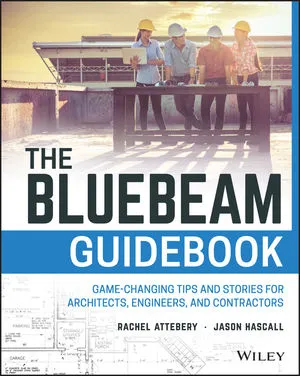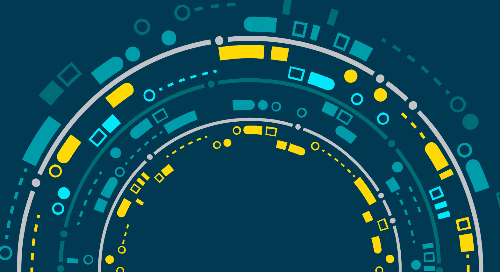why-publish-with-wiley-engineering
April 23, 2021
Rachel Attebery
- Picture
-

- Description
-
We spoke with Rachel Attebery, Wiley author of The Bluebeam Guidebook: Game-changing Tips and Stories for Architects, Engineers, and Contractors, to talk about her reasons for writing a book, her experience with Wiley during the process, and how publishing a book has benefited her career and enriched her life. Read her responses below.*
Why did you write a book?
I decided to write a book because my colleague and I had been answering questions within our company for about three years, and over that period of time we had developed so much written training material, so much video training material, and we were really looking for a way to codify this and distribute it even to people beyond our company. We figured if there were as many folks as we were trying to train within our company, surely there were many more outside of our company, within the industry, that could benefit from what we have learned … over the past few years. That’s why we wanted to write everything down and make it available to our peers.
What benefits are there to being an author?
"There's a big credibility boost that goes along with having your name on a published technical work..."
Obviously there’s a big credibility boost that goes along with having your name on a published technical work. My co-author and I enjoyed the extra credibility, the extra publicity that came from having our name on a work that was published through a company like Wiley, who is very prestigious and well-known within the industry.
It also presented a lot of great networking opportunities. So, for example, our book was actually purchased and then distributed at the national conference for the software that we wrote about. And so while we were at the conference, we got to discuss with other attendees from the industry our book; we got to talk about what they were doing with the software in their company; we got to talk about ways that we could potentially innovate other ways of using the software to advance the ways we were doing engineering and construction architecture as a whole.
Can you describe how you considered the unique needs of engineers when you developed your book?
One of the things that we considered when we conceived of this book and started planning what we would include in it, what we would focus on, and how we would make it stand apart from all the existing training materials that were already out there for this particular software was, “How do people like myself, my co-author, and our other peers actually use this in a very practical way on actual projects in the AEC industry that are being worked on every day?”
We had the publicly available training manuals for the software, which were fantastic as far as, “Click this button, then click that button, then click over here …” But we really wanted to take that a step further and explain the practical value proposition in the real world of using this software on real-life projects.
We were able to interview peers from within our own company, from external companies in the same industry, and have these people really tell their stories—their case studies—about how they use this software in their everyday careers and how it made a difference for them.
Why did you choose Wiley as your publisher?
Wiley was recommended to us by my boss at the time, who had previously published with Wiley about building information modeling (BIM). He had had such a great experience, his book is now published in several different languages, and he’s had speaking opportunities that arose from that publication. So, when my co-author and I had this idea to write a book and we talked to my boss about it, he recommended Wiley, made the connection for us, and we were able to start that relationship for ourselves. The rest is history!
The process was really easy, and the team was really great to work with and was very responsive. So as first-time authors, my co-author and I had a really positive experience working with Wiley.
Can you describe your working relationship with your editor?
Working with our editor at Wiley through the writing, editing, and publishing process (which is more intense than I had imagined!), the folks at Wiley were really clear, helpful, and communicative in explaining to us what the process was going to look like, what we needed to deliver at certain times, what our overall timeframe was, how the book would actually be distributed, and how we could actually count on the publication getting out there for readers to buy it.
So, what we really appreciated about the Wiley team through this process was that they really held our hands through the whole thing and made us feel comfortable, explaining to us how this was all going to work. And, at the end of the day, they did push us. We had planned to do this as a hobby, and they helped us put together a schedule that was going to actually get this book out in an appropriate amount of time. And it turned out to be a great success for us. We’re really happy that we were able to work with Wiley and let them guide us through the process.
How did you feel when you saw your book published for the first time?
"Being able to actually see the work of an entire year published like this, looking so professional and so official, and really codifying and documenting everything that my co-author and I had worked so hard to learn and to practice for the past few years... It was a really proud moment. It was a big accomplishment."
After all the hard work of writing, editing, and publishing is done, the proud moment comes. You get to actually open up the box that has a physical copy of your work in it. And it looks exactly like you had imagined—it’s the art you picked out, the colors you picked out, you get to page through it and see all the screenshots you painstakingly took and pasted into each chapter …
Being able to actually see the work of an entire year published like this, looking so professional and so official, and really codifying and documenting everything that my co-author and I had worked so hard to learn and to practice for the past few years. It was really a proud moment. It was a big accomplishment, and a big success for us. And I really can’t describe the feeling of being able to look over at this book on the bookshelf and say, “Yeah, that was about four years of my life that was dedicated to that software and training people in my industry on how to do our jobs more efficiently and productively.” And I’m really proud of that. It’s a great reminder of some of the accomplishments in my career.

What advice would you give someone who is considering writing a professional engineering book?
"It will take your weekends, it will take your evenings. But it's so worth it."
Absolutely go for it. I will say, it is not easy—it will take your weekends, it will take your evenings. But it’s so worth it. And if you’re looking to go through this process, I really can’t recommend Wiley enough. They’ve been doing this a long time, they know how it’s done, and they will walk you through the process so that the knowledge you have and the message you want to carry to the broader audience really gets out there in the best and most professional way that it can.
Would you encourage others to publish with Wiley?
"There's no way we would have been able to accomplish what we did without Wiley walking us through the process and really making that pathway possible for us."
I would absolutely encourage any other authors—first-time, second-time, career authors—to consider publishing with Wiley. The whole process was very smooth. There was plenty of communication but no micromanaging, no nagging. They made the whole thing very seamless. And, at the end of the day, we accomplished what we wanted to together, which was to create a great and valuable guide for a modern piece of software for the AEC industry. And I think that there’s no way we would have been able to accomplish that as well as we did without Wiley walking us through that process and really making that pathway possible for us.
*Some responses have been adapted for readability.









